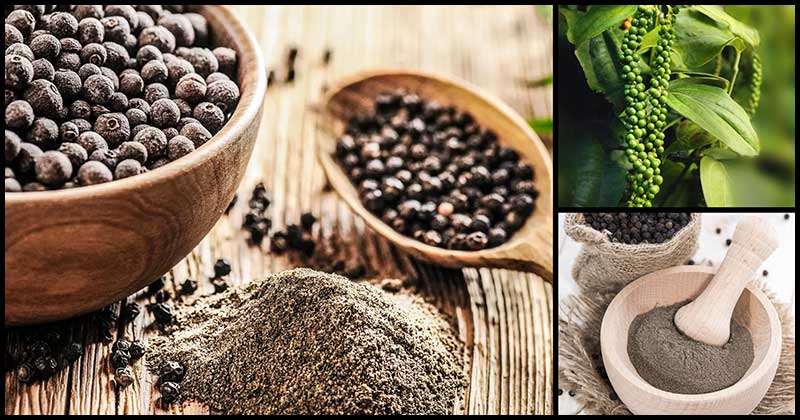Black pepper has a sharp and mildly spicy flavor. It is one of the most commonly used spices in the world. It is considered an anti-inflammatory agent and possesses antibacterial properties (1).
In addition to this, black pepper is also used as a medicine. People have been taking it by mouth for arthritis, asthma, upset stomach, bronchitis, a bacterial infection that causes diarrhea (cholera), colic, depression, diarrhea, gas, headache, sex drive, menstrual pain, stuffy nose, sinus infection, dizziness, discolored skin (vitiligo), weight loss, and cancer (2).
Here are the health benefits of black pepper in detail:
May Improve Blood Sugar Control
Black pepper is rich in a plant compound called piperine which may help improve blood sugar metabolism.
In a study, results showed that rats fed with black pepper extract experienced a reduced frequency of spike in blood sugar levels compared to rats in the control group (3).
In a human study, researchers found that taking a supplement containing piperine and other compounds for 8 weeks can significantly improve people’s insulin sensitivity – a measure of how well the hormone insulin removes glucose from the bloodstream (4).
Antibacterial Quality
Black pepper possesses antibacterial properties that help fight against infections and insect bites. Results of a study showed that pepper contains compounds that can fight against Bacillus subtilis, Bacillus sphaericus, Staphylococcus aureus among gram-positive bacteria, and against certain gram-negative bacterial strains (1).
Digestion And Intestinal Health
Black pepper has carminative properties which help reduce discomfort and gas buildup in our intestines. It also stimulates hydrochloric acid in the stomach so that we can better digest and absorb the foods we eat (5).
Animal studies show that black pepper may also prevent diarrhea by inhibiting muscle spasms in the digestive tract and slowing the digestion of foods (6).
Helps Boost Nutrient Absorption
Black pepper can enhance the absorption and function of curcumin – the active ingredient in the popular anti-inflammatory spice turmeric.
In a study, it was found that taking 20 mg of piperine with 2 grams of curcumin improved the availability of curcumin in human blood by 2,000% (7).
Consumption of it may also improve beta-carotene absorption in the body Beta-carotene is known as a powerful antioxidant that may combat cellular damages that have been linked to several chronic conditions like heart diseases.
Taking 15 mg of beta-carotene with 5 mg of piperine substantially increased blood levels of beta-carotene compared to taking beta-carotene alone, according to research (8).
Gives Relief From Peptic Ulcer
There were studies showing that pepper’s antioxidant and anti-inflammatory properties may have beneficial effects on gastric mucosal damage and peptic ulcers (9).
Tips On How To Use Black Pepper
Prepare grounded pepper powder at home instead of buying it ready-made.
Improve digestion, as well as the taste of any dish by adding a pinch of black pepper.
Sprinkle a small pinch of black pepper to eggs, on salads, or when marinating meat.
Sources:
- https://www.organicfacts.net/health-benefits/herbs-and-spices/health-benefits-of-black-pepper.html
- https://www.rxlist.com/black_pepper/supplements.htm
- https://pubmed.ncbi.nlm.nih.gov/29683271/
- https://pubmed.ncbi.nlm.nih.gov/23271695/
- https://www.webmd.com/diet/health-benefits-black-pepper#1
- https://www.healthline.com/nutrition/is-black-pepper-good-for-you#benefits
- https://www.ncbi.nlm.nih.gov/pmc/articles/PMC5664031/
- https://www.sciencedirect.com/science/article/abs/pii/S027153179900007X
- https://www.ncbi.nlm.nih.gov/pmc/articles/PMC2883126/









